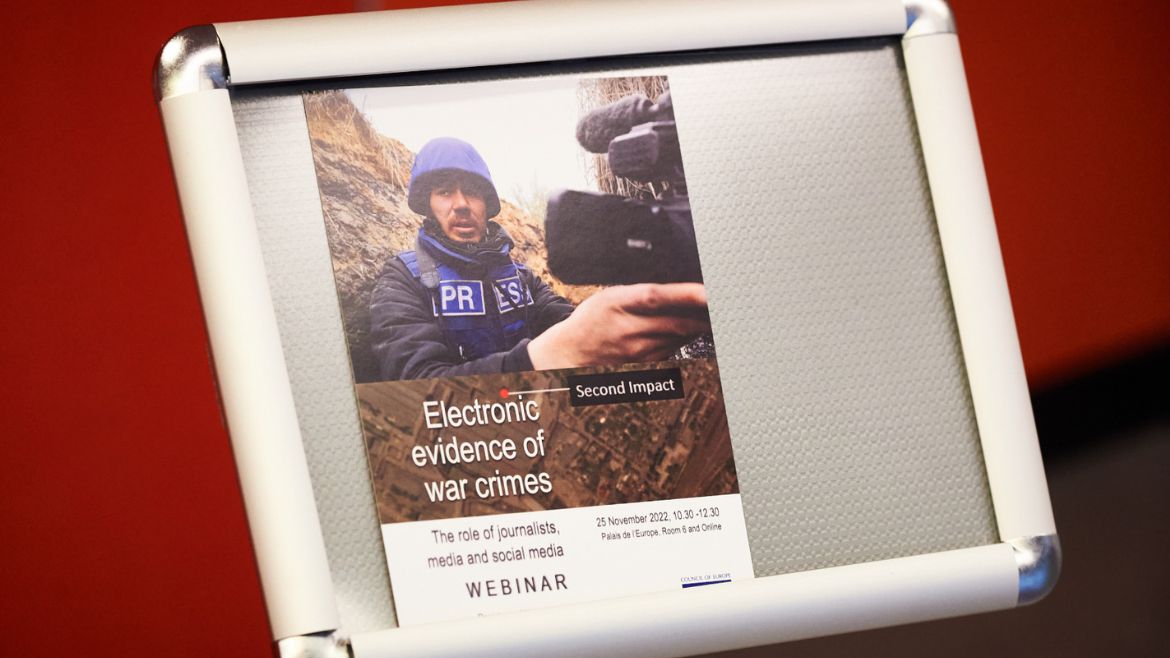The webinar "Electronic evidence of war crimes. The role of journalists, media and social media” has been held on 25 November 2022 in Strasbourg organized by the Group of Friends on the Safety of Journalists and Media Freedom in Strasbourg and the Council of Europe.
The Ukrainian law enforcement bodies reported that during nine months of war, there are 67005 crimes registered related to the aggression of the Russian Federation, among which 46563 are war crimes. Besides the work of the law enforcement bodies, there are more actors who track atrocities in Ukraine, and these are the journalists and the media. Their role, as well as the role of social media, human rights activists and ordinary citizens is huge in collecting, preserving and verifying open-source information related to the war crimes.
Ambassador Marten Ehnberg, Permanent Representative of Sweden to the Council of Europe, Chair of the Group of Friends on the Safety of Journalists and Media Freedom, highlighted the important role of journalists and media actors for collecting evidence of war crimes that would in return contribute to bringing to justice those responsible. “Collecting and documenting alleged war crimes and crimes against humanity committed during the Russian armed aggression in Ukraine using open source data requires proper capacity and resources. The journalists and media, specifically public service broadcaster in Ukraine, require sustainable support for reporting on atrocities of war and human rights violations on the ground. This is important for the citizens of Ukraine and the world”, he also mentioned.
Mr Patrick Penninckx, Head of Information Society of the Council of Europe, said “Open source evidence can become admissible evidence in court proceedings provided that proper procedural powers and practical tools are used and followed. The Council of Europe Budapest Convention and its Article 32 provide avenues through which open-source intelligence and information from foreign sources can be brought into criminal proceedings. The challenges of managing an open-source information and its use as electronic evidence are multiple. The full implementation of procedural powers in particular data preservation and data production provisions are already available under the Budapest Convention and can mitigate those problems.”
The Council of Europe Cybercrime Programme Office, though joint action with DGI and Kyiv Office, works with Prosecutor General’s Office of Ukraine since May 2022 by offering legal advice on admissibility of open-source intelligence in criminal proceedings, and has trained prosecutors and investigators on use of open-source intelligence in cooperation with CEPOL/Europol in August 2022.
Within the Council of Europe Immediate Action Package “Support to Safety of Journalists, Media, and of Access to Information” the support has been provided to Ukrainian Public Broadcaster and four local media organisations enabling their effective operation during war time and documenting the war crimes in Ukraine.
Mr Eliot Higgins, founder of Bellingcat, British journalist, as a key speaker of the webinar shared the unique experience of Bellingcat in collecting the evidence of crimes using open sources. Mr. Higgins presented the web resource Civilian Harm in Ukraine (bellingcat.com) which contains geolocated data on incidents in Ukraine that have resulted in potential civilian harm. Bellingcat is working on creating a platform which allows multiple archives to be indexed and turned into a searchable platform.
Ms. Anna Babinets, Editor-in-Chief of Slidstvo.info investigative agency based in Kyiv made a presentation on how investigative reporters document war crimes in Ukraine. “We launched a project https://rwc.shtab.net/en aiming to identify servicemen of the Russian Federation who are directly involved in the Russian war against Ukraine. Its objective is to assist in gathering evidence of crimes committed by individuals during hostilities - for further use by Ukrainian and international investigators and to provide this evidence in Ukrainian courts and the International Criminal Court”, she mentioned.
Mr. Taras Semkiv, Deputy Head of the Department of Countering the Crimes Committed During Armed Conflict of the Prosecutor General's Office of Ukraine, reported about the challenges of documenting war crimes in Ukraine and also stressed on the cooperation with the journalists and media. The war crimes have led to the death of 8,385 civilians (including 437 children) and to injury of 11,322 civilians (including 839 children). 65 thousand objects of civilian infrastructure have been destroyed and damaged. For committing those actions, 217 persons have been notified of suspicion. The indictments have been lodged before the court against 61 persons and 12 persons have been convicted. Unlawful deprivation of liberty, ill treatment and killings, shelling of civilian objects and the civilian population, Russian strikes on electrical energy facilities, forced deportation are among crimes being under procedural control of the Office of the Prosecutor General of Ukraine
Mr Daniel Breger, Legal Counsellor, United Kingdom Delegation to the Council of Europe, concluded the webinar by mentioning that there must be no impunity to serious war crime. He also stressed full support to the work of journalists and media in Ukraine.
Collecting and documenting war crimes and crimes against humanity committed during the Russian armed aggression in Ukraine using open source data requires coordinating the efforts of different organisations, proper capacity and resources.
The recordings of the webinar in English and Ukrainian are available on the webpage dedicated to it.




